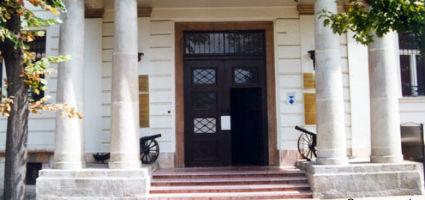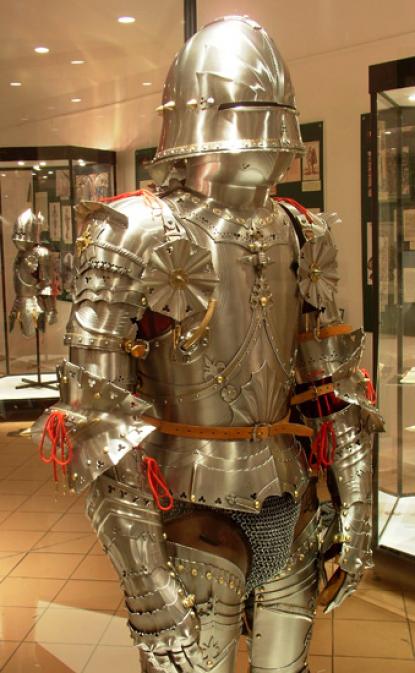2025. September 30. Tuesday
HM, Museum and Institution of Military History - Budapest
 |
Address: 1014, Budapest Tóth Árpád sétány 40.
Phone number: (1) 325-1600, (1) 325-1601
E-mail: him@militaria.hu
Opening hours: 01.04-31.09.: Tue-Sun 10-18
01.10-31.03.: Tue-Sun 10-16 |
The exhibition has closed for visitors.
2006.06.15. 00:00
Museum tickets, service costs:
|
Ticket for adults
|
1400 HUF
|
/ capita
|
|
Ticket for students
(6-26 years of age)
|
700 HUF
|
/ capita
|
|
Group ticket for students
|
300 HUF
|
|
|
Ticket for pensioners
(62-70 years of age)
|
700 HUF
|
/ capita
|
|
Ticket for families
(max. 2 adults + 4 children)
|
2500 HUF
|
/ family
|
|
Program ticket
|
700 HUF
|
|
|
Guide
|
700 HUF
|
|
|
Guide
|
8000 HUF
|
/ max. 20 capita
|
|
Guide
|
12000 HUF
|
/ min. 20 capita
|
An exhibition organized by the HM Museum of Military History, the Franciscan Order named after Saint john of Kapisztrán and the HM Catholic Army Chaplain Service salutes the Victory of Nándorfehérvár and the anniversary of the death of Saint John of Ornamental Circle. The object was to show rarities from private and church collections that were less known or has never been published before.

The codex written around 1380 is of special interest. Originally the Crown Bishop Harassi Herzan Ferenc owned it. The museum bought the codex in 1948. An original cup made of wood from the 15th century the so-called Kapisztrán Cap is shown for the first time now. The chair of Saint James of Marchia is the oldest furniture borrowed from the collection of the National Museum. The Koran of the pasha Abdi Ahmed Arnaut is taken from the collection of the HM HIM.
The armor maker master Pádár Gyula created Gothic armors for years. Sacrificial objects, candleholders can also be seen from several collections. At the beginning of the exhibition we wish to review the atmosphere of the period and the life of Saint john of Kapisztrán and that of Hunyadi. The visitors meet two young men from illustrious families who both received good education. Saint John of Kapisztrán turned towards the church while Hunyadi János stayed an excellent soldier with fame all over Europe.
Nándorfehérvár appears in the first ward not just as the bastion of Europe but also as the meeting point of the two individuals. The shields, amours, findings from excavations, flags etc. are all connected to the famed men. In the other part of the ward, we recall the siege itself, the victory and the news that spread around, later the pest epidemic and eventually the death of the two heroes. Besides, we also show contemporary maps.
The visitors may learn of the history of Beograd from 1456 to 1918. Its unique geographical situation rendered it a stressed role in history even in the 20th century. The object of the organizers was to show the cult of the two heroes through the history of the fortress. An independent block shows the church in Kapisztrán Square, representations on it, as well as the Kapisztrán Statue erected by Damkó József in 1922.
The focus in the second ward is on the Kapisztrán and Hunyadi pictures of Lotz Károly. The flags, the reconstruction of a Hunyadi flag and a copy of a Royal flag are also of interest. We also show a number of charters, all from the archives of the Franciscan Order. Most of the paintings are from the Christian Museum of Esztergom and Franciscan Churches. However, we also borrowed pictures from private collections. Several coins and badges are also shown from the numismatics collection of the HM HIM. The memorial coin made for the occasion is a specialty.

The codex written around 1380 is of special interest. Originally the Crown Bishop Harassi Herzan Ferenc owned it. The museum bought the codex in 1948. An original cup made of wood from the 15th century the so-called Kapisztrán Cap is shown for the first time now. The chair of Saint James of Marchia is the oldest furniture borrowed from the collection of the National Museum. The Koran of the pasha Abdi Ahmed Arnaut is taken from the collection of the HM HIM.
The armor maker master Pádár Gyula created Gothic armors for years. Sacrificial objects, candleholders can also be seen from several collections. At the beginning of the exhibition we wish to review the atmosphere of the period and the life of Saint john of Kapisztrán and that of Hunyadi. The visitors meet two young men from illustrious families who both received good education. Saint John of Kapisztrán turned towards the church while Hunyadi János stayed an excellent soldier with fame all over Europe.
Nándorfehérvár appears in the first ward not just as the bastion of Europe but also as the meeting point of the two individuals. The shields, amours, findings from excavations, flags etc. are all connected to the famed men. In the other part of the ward, we recall the siege itself, the victory and the news that spread around, later the pest epidemic and eventually the death of the two heroes. Besides, we also show contemporary maps.
The visitors may learn of the history of Beograd from 1456 to 1918. Its unique geographical situation rendered it a stressed role in history even in the 20th century. The object of the organizers was to show the cult of the two heroes through the history of the fortress. An independent block shows the church in Kapisztrán Square, representations on it, as well as the Kapisztrán Statue erected by Damkó József in 1922.
The focus in the second ward is on the Kapisztrán and Hunyadi pictures of Lotz Károly. The flags, the reconstruction of a Hunyadi flag and a copy of a Royal flag are also of interest. We also show a number of charters, all from the archives of the Franciscan Order. Most of the paintings are from the Christian Museum of Esztergom and Franciscan Churches. However, we also borrowed pictures from private collections. Several coins and badges are also shown from the numismatics collection of the HM HIM. The memorial coin made for the occasion is a specialty.
